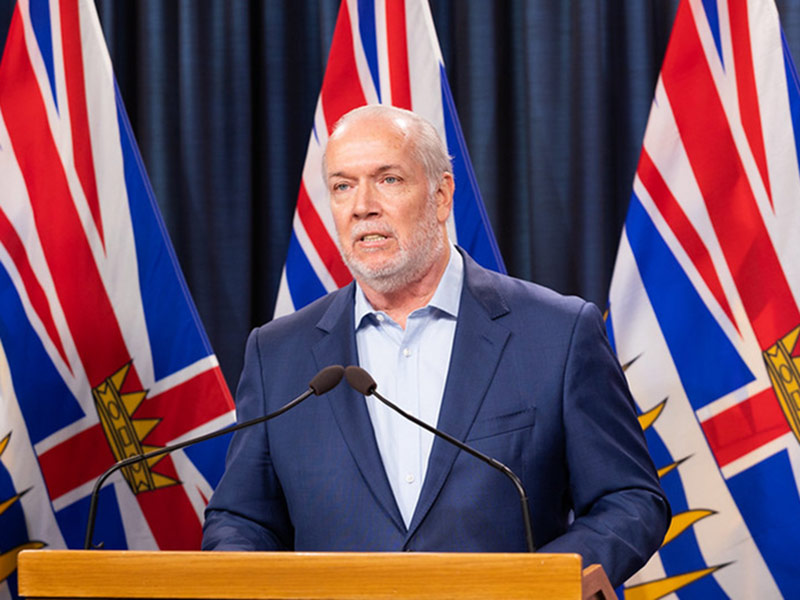British Columbia has declared a state of emergency and asked for help from the Canadian Armed Forces as the province recovers from flooding and landslides following last weekend’s record rainfall.
But even as Premier John Horgan described this year’s weather as “unprecedented,” he stressed the need for the province to become more resilient in the long term as it prepares for even more extreme weather expected to come with climate change.
“The last few days have been incredibly difficult for British Columbians as we’ve experienced yet another natural disaster,” Horgan said Wednesday during his first media availability since late October, when he underwent biopsy surgery on a lump in his throat that has been diagnosed as cancerous.
Horgan mentioned the severe wildfires the province has experienced in recent years and last summer’s "heat dome" that saw temperatures hit record highs, the town of Lytton destroyed by fire, and nearly 600 heat-related deaths in the province.
This week heavy rainfall from an “atmospheric river” led to flooding, including in the Fraser Valley and on Southern Vancouver Island, and to landslides that closed several highways and cut Metro Vancouver’s transportation links to Eastern Canada. The Coquihalla Highway between Hope and Merritt is expected to be closed for weeks or months.
At least one person died in a landslide on Highway 99 north of Pemberton, and Horgan said he expects there have been more deaths yet to be discovered.
The provincial government estimated that some 17,775 people have been evacuated due to impacts from the flooding and said there are evacuation orders for 5,918 properties, with another 3,632 on evacuation alert.
According to Agriculture Minister Lana Popham, thousands of animals have died in the flooding and many more remain in danger.
“I think all British Columbians fully understand that now we have to better prepare for events like this, but we couldn’t have even imagined it six months ago,” Horgan said. “We need to start preparing for a future that includes more regular events like this, and we fully intend to do that.”
Much of Wednesday’s news conference focused on the immediate steps needed to reopen highways and railways and respond to the disaster. Horgan said the province has asked for the Armed Forces’ assistance with tasks like evacuations, keeping supply chains running and providing drinking water.
Declaring a 14-day state of emergency allows federal, provincial and local resources to be delivered in a co-ordinated response to protect the public, according to the government’s announcement.
Referring to stories about many stores being short on food and other supplies, Horgan said, “Please do not hoard items. What you need, your neighbours need as well.”
Public Safety Minister and Solicitor General Mike Farnworth defended the province’s failure to use Emergency Management BC’s “Alert Ready” system that can send a warning message to cellphone users and interrupt television and radio broadcasts with a warning.
The system is used in situations where affected communities request it, he said, and that information about conditions had been provided through the DriveBC website.
When Jackie Tegart, the BC Liberal MLA for Fraser-Nicola, raised the same question in the legislature Wednesday afternoon, Farnworth responded that the alerts are not a “silver bullet” and that significant work ahead of and during the storm had included regularly updating DriveBC, communicating stream flow and flood warnings to local governments, and communicating with the federal government.
BC Green Party Leader Sonia Furstenau, who represents the Cowichan Valley, said extreme heavy rain was predicted in the 2014 report The Future of Atmospheric Rivers and Actions to Reduce Impacts on British Columbians, the result of a partnership between the Ministry of Environment, the Pacific Institute for Climate Solutions and the Pacific Climate Impacts Consortium.
“It identifies that atmospheric rivers will be more frequent and more extreme, particularly in coastal British Columbia,” Furstenau said, adding that the report raised concerns about mortality, the isolation of communities and the loss of critical infrastructure.
“Three of the recommendations from the report are about infrastructure: to develop maps of critical infrastructure, assess the vulnerability of critical infrastructure and relocate critical infrastructure where needed,” she said. “What work has his ministry done in the past two years to assess the state of critical infrastructure in B.C. and to pinpoint the potential fault lines of our highways and roads?”
Transportation Minister Rob Fleming said the government has been working on improving the resiliency of the province’s infrastructure since coming to power in 2017.
“It’s a $7.6-billion infrastructure budget today,” he said. “We will spare no expense and dedicate every resource possible to rebuild and recover the infrastructure that British Columbians built.”
In an earlier statement, Furstenau said the government had to be more proactive. “The impacts of climate change are going to continue to accelerate and we must get out of the reactive mode that this government has adopted,” she said.
“British Columbians deserve to know that the government has a plan, what that plan is, and that it is doing everything possible to mitigate the effects of these escalating climate disasters.” ![]()
Read more: BC Politics, Environment, Urban Planning + Architecture
















Tyee Commenting Guidelines
Comments that violate guidelines risk being deleted, and violations may result in a temporary or permanent user ban. Maintain the spirit of good conversation to stay in the discussion.
*Please note The Tyee is not a forum for spreading misinformation about COVID-19, denying its existence or minimizing its risk to public health.
Do:
Do not: